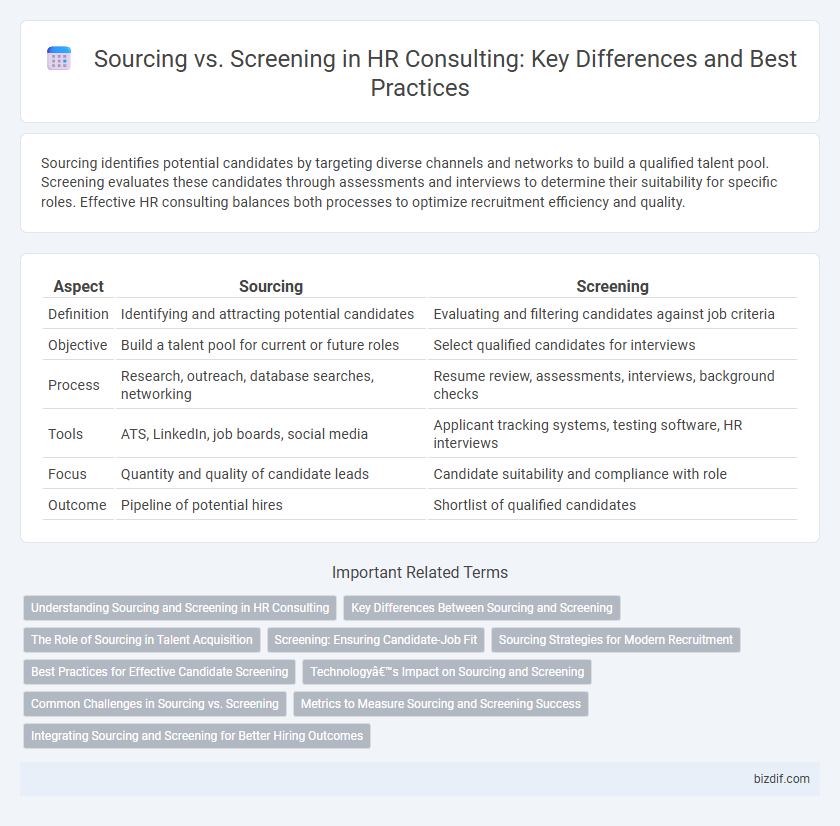Sourcing identifies potential candidates by targeting diverse channels and networks to build a qualified talent pool. Screening evaluates these candidates through assessments and interviews to determine their suitability for specific roles. Effective HR consulting balances both processes to optimize recruitment efficiency and quality.
Table of Comparison
| Aspect | Sourcing | Screening |
|---|---|---|
| Definition | Identifying and attracting potential candidates | Evaluating and filtering candidates against job criteria |
| Objective | Build a talent pool for current or future roles | Select qualified candidates for interviews |
| Process | Research, outreach, database searches, networking | Resume review, assessments, interviews, background checks |
| Tools | ATS, LinkedIn, job boards, social media | Applicant tracking systems, testing software, HR interviews |
| Focus | Quantity and quality of candidate leads | Candidate suitability and compliance with role |
| Outcome | Pipeline of potential hires | Shortlist of qualified candidates |
Understanding Sourcing and Screening in HR Consulting
Sourcing in HR consulting involves proactively identifying and attracting qualified candidates through various channels such as job boards, social media, and networking events. Screening focuses on evaluating these candidates by assessing resumes, conducting interviews, and performing background checks to ensure alignment with job requirements and company culture. Effective sourcing and screening processes lead to higher quality hires and reduced time-to-fill metrics in recruitment efforts.
Key Differences Between Sourcing and Screening
Sourcing involves identifying and attracting potential candidates through strategies like job board searches, social media outreach, and networking, aimed at building a talent pool. Screening refers to evaluating applicants via resume reviews, skill assessments, and interviews to shortlist qualified candidates. The key difference lies in sourcing targeting candidate discovery, while screening concentrates on candidate evaluation and selection.
The Role of Sourcing in Talent Acquisition
Sourcing plays a critical role in talent acquisition by identifying and attracting qualified candidates through various channels such as job boards, social media, and professional networks. This proactive approach enhances the talent pipeline and reduces time-to-hire by targeting passive and active job seekers. Effective sourcing lays the foundation for successful screening processes by delivering a curated pool of potential hires aligned with organizational needs.
Screening: Ensuring Candidate-Job Fit
Screening in HR consulting is crucial for ensuring candidate-job fit by evaluating qualifications, skills, and cultural alignment through structured assessments and behavioral interviews. This thorough vetting process reduces turnover rates and enhances workforce productivity by selecting candidates who meet specific role requirements and company values. Effective screening integrates data-driven tools and expert judgment to identify top talent that drives organizational success.
Sourcing Strategies for Modern Recruitment
Sourcing strategies for modern recruitment emphasize leveraging advanced technologies such as AI-driven candidate databases, social media platforms like LinkedIn, and niche job boards to identify high-potential talent proactively. Effective sourcing integrates employer branding and targeted outreach campaigns to expand the talent pool beyond traditional methods, ensuring diversity and quality. Data analytics and CRM tools optimize candidate engagement and pipeline management, enabling recruiters to match organizational needs with skilled professionals efficiently.
Best Practices for Effective Candidate Screening
Effective candidate screening begins with sourcing high-quality talent through targeted job boards, social media platforms, and employee referrals to ensure a diverse and qualified applicant pool. Implement structured screening techniques such as standardized questionnaires, skill assessments, and behavioral interviews to objectively evaluate competencies and cultural fit. Leveraging applicant tracking systems (ATS) improves efficiency by automating resume parsing and ranking candidates based on job-specific criteria, enhancing overall recruitment quality.
Technology’s Impact on Sourcing and Screening
Technology revolutionizes sourcing by leveraging AI-driven platforms and big data analytics to identify and engage high-quality candidates with precision and speed. Automated screening tools utilize machine learning algorithms to evaluate resumes and assess candidate fit based on skill matching and predictive performance metrics. These advancements reduce time-to-hire and enhance decision accuracy, enabling HR professionals to focus on strategic talent acquisition.
Common Challenges in Sourcing vs. Screening
Common challenges in sourcing include identifying qualified candidates efficiently and accessing diverse talent pools amid high competition. Screening difficulties often involve accurately assessing candidate skills and cultural fit while managing large applicant volumes. Both processes require effective tools and strategies to reduce bias and enhance hiring quality.
Metrics to Measure Sourcing and Screening Success
Key metrics for sourcing success include candidate volume, source quality, and time-to-fill, highlighting the efficiency of attracting qualified applicants. Screening effectiveness is measured by candidate-to-hire ratio, screening accuracy, and dropout rates during assessment phases, reflecting the ability to identify suitable candidates. Tracking these metrics optimizes recruitment strategies, ensuring better talent acquisition outcomes and reduced hiring costs.
Integrating Sourcing and Screening for Better Hiring Outcomes
Integrating sourcing and screening processes enhances recruitment efficiency by ensuring candidates meet job requirements from the earliest stage. Leveraging data-driven sourcing strategies paired with comprehensive screening techniques reduces time-to-hire and improves candidate quality. HR consulting firms emphasize this integration to align talent acquisition with organizational goals and workforce needs.
Sourcing vs screening Infographic

 bizdif.com
bizdif.com